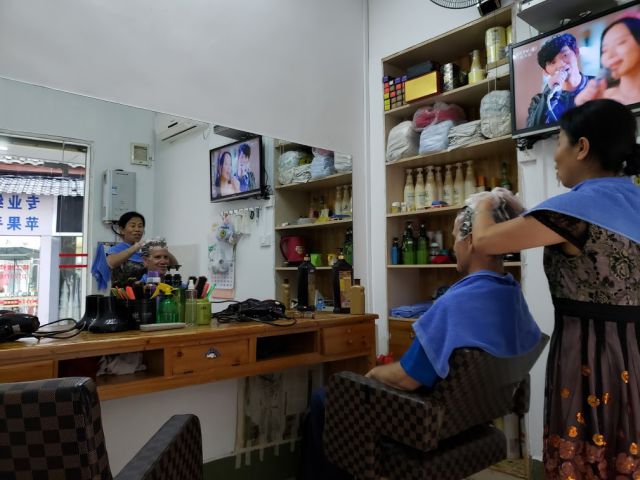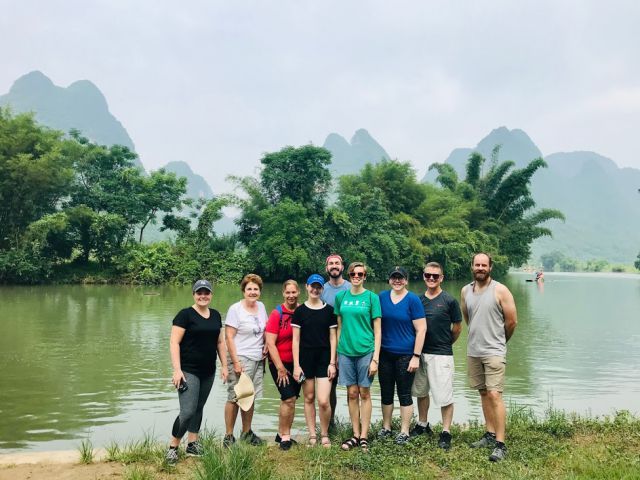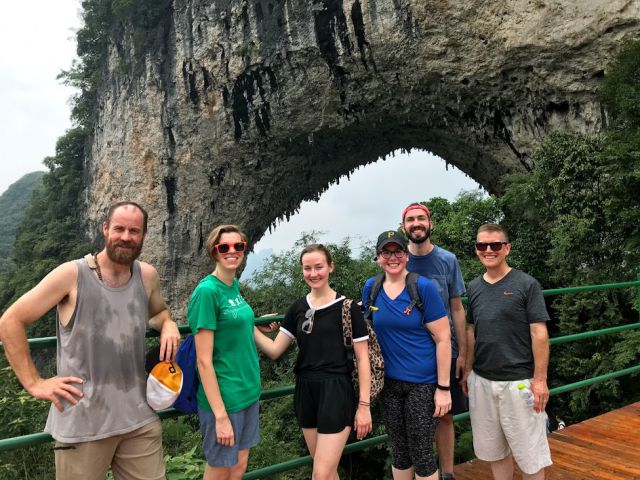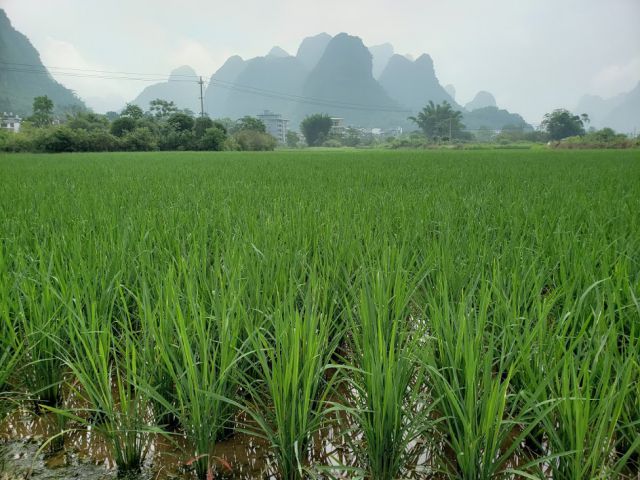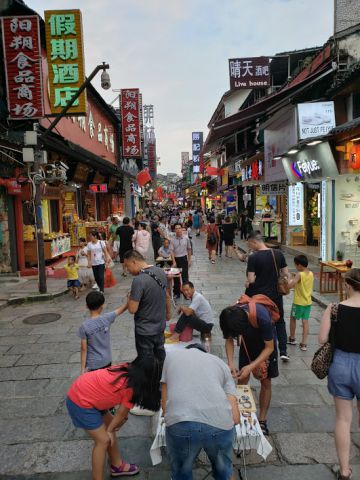Tell someone that you’re going to China, and you’ll get the usual questions about seeing Beijing, the Great Wall, Shanghai, Xi’an, and the terra cotta warriors. However, you probably wouldn’t expect to hear questions about Yangshuo or its wondrous landscapes or thriving tourism industry. Yet, Yangshuo has been on the radar of Western tourists for decades and offers a Chinese experience removed from Buddhist temples and imperial or Communist history. The 20 yuan bill includes an image of Mao Zedong on the indomitable Li River of Yangshuo, so clearly the Chinese government believes it to be a place of great importance. Yangshuo might be the least traditional Chinese city that a tourist will encounter, although it is supported by the Chinese government and serves as an example of their fledgling eco-tourism industry.
If someone is going to discuss Yangshuo, it won’t take long until the stunning karst mountains are mentioned. For those individuals that have traveled to Halong Bay off the coast of northern Vietnam, the Karst Mountains of Yangshuo should look familiar. In addition to the sharp peaks formed by millions of years of erosion, Karst mountains are also famous for caves and underground lagoons due to their primarily limestone composition. As one of the defining features of Yangshuo, you can be sure that the locals have built an industry around such beautiful aesthetics. There is rock climbing available throughout Yangshuo County and a common destinations for tourists is Moon Hill. The hike to Moon Hill may not be easily completed by any tourist, but take a quick look online and it certainly seems worth it. Another activity that tourists engage in upon visiting Yangshuo is renting a bicycle and simply exploring the countryside. With the mountains as a backdrop and trails throughout the region, cycling has become a common tradition for visitors to Yangshuo.
The Li River is the other defining physical feature of Yangshuo. With bamboo boat rides and fishing with cormorants on the table, it’d be difficult not to be entranced by Yangshuo. Cormorants are birds trained to catch fish and then bring them to fishermen. When in Yangshuo, individuals should dabble in seafood with one of the most popular dishes in the region being beer fish. The cormorant is an iconic image associated with the people of Yangshuo, but some tourists doubt whether it is still an authentic means to fish or merely a performance put on for visitors. Reading through countless travel blogs, it is quickly apparent that tourists recognize Yangshuo as a region at war with its identity. The Yangshuo of the West, streets littered with tourist restaurants and shops and doing all it can to promote English-language learning as a means to support tourism industry. In fact, there are several English-language schools on the two main streets in Yangshuo. Then, there’s the Yangshuo of China, a place where domestic tourists go to escape the hustle and bustle of cities and to take advantage of China’s ever improving standard of living and rising incomes. When thinking of Chinese tourism, too often individuals might think of ideal locations for foreigners to visit, but a more affluent China is sending millions upon millions of Chinese citizens out into the world. Similar to excursions to the Rocky Mountains or a weeklong stay in the Poconos, Yangshuo offers a domestic getaway for Chinese citizens looking for eco-tourism.
Despite my apprehension about going to a place that seemed too Western or at least not Chinese enough, I loved my time in Yangshuo. Even with the preponderance of clubs and fast food on the main pedestrian area, it did not detract from the experiences out in the surrounding countryside. In fact, the people of Yangshuo seemed no different than the rest of the people we'd encountered on our trip up to that point: kind, outgoing, and looking for our business. On the first day in town, it was raining steadily which limited many of our outdoor activity options. So, Dr. Kenley and I were both in need of a haircut and we found a small place on a side street just off the major shopping areas. The hairdresser and David had a lively conversation going for over 30 minutes and she talked all about her family and the Yangshuo area. Included in the hair cut was a vigorous head washing/massage which was equal parts pleasant and painful. If you have the opportunity to get a hair cut in China, please make sure that this component is included. It was quite the experience! A clear indicator of how Yangshuo functions differently from other Chinese cities is how few people were out and about early in the morning. Admittedly, I did not stay up late enough to see when the parties ended every night, but the streets were deserted until nearly 9 AM each day as our crew went in search of breakfast. Like the tourists, it seemed like the townspeople were recovering from busy nights. However, Lucy's Place was always there for us and served the most amazing banana crumble. I do not speak in jest, it was scrumptious. If you take nothing away from this blog other than the name of this amazing restaurant (Lucy's Place) and the divine dessert it serves (banana crumble), then I'll consider it a success.
One of the great things about China is that many of its most beautiful and historic sites are not always located downtown in a major city. There might always be an easier way to access these locations (chair lift at the Great Wall and Emei Shan), but there is often the option of taking the more challenging, physical path. I find that I appreciate experiences and wondrous views more fully when I've felt I worked hard enough to deserve them. Our bike ride through Yangshuo County was wonderful and several hours long. The views would have been the same from a car, but it wouldn't have been remotely the same experience. The climb to Moon Hill wasn't terribly long, but the quick ascent and humid conditions left our group sweating buckets when we arrived at the top. Instead of overshadowing the experience, the shared struggle of our climb enhanced our time together at the top and our ensuing lunch with a local family when we made it back down from Moon Hill. Regardless of the tourist-heavy nature of Yangshuo and its environs, I loved every second of our time there. On the opposite end of the continuum, in the midst of our bike ride, we stopped at a natural* hot spring inside of a mountain. The hot pools were a pleasant break after hours of riding, yet the true joy of this place came from the myriad shops we were forced to walk through in order to escape the mountain. Any time we thought we were close to an exit, there'd be another slew of tables to pass through. I wasn't angry or annoyed; rather, I was impressed by the relentless quest to turn a profit inside of a mountain. Albeit the natural beauty of Yangshuo or its tourism-heavy economy, it's absolutely a place worth-visiting.
In my class, we talk about the economic reforms under Deng Xiaoping and the phrase credited to him "To get rich is glorious." I think Yangshuo is a perfect example of China moving towards capitalism. The whole county is seemingly set up to cater to the needs of tourists, both domestic and international. Another topic I'd like to touch on in my class in terms of Yangshuo is eco-tourism. I'd like to contrast ecotourism efforts in America and China while having students investigate reasons for the differences. The hair cut experience that Dr. Kenley and I shared in Yangshuo is the kind of personal story that my students need to hear. Many of them have yet to leave the country or even Pennsylvania, so their perceptions of people from other countries are typically way off the mark. I hope the hair cut adventure can humanize the Chinese people for my students, instead of having them be categorized as an "other."
Study Tour
